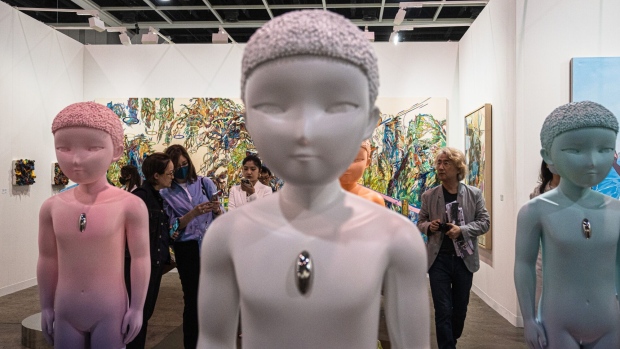Mar 27, 2024
Art Basel Hong Kong’s Full-Scale Return Tests City’s Events Appeal
, Bloomberg News

(Bloomberg) -- Art Basel is returning to Hong Kong at its pre-pandemic scale, giving a much-needed jolt to the city’s muted events landscape.
The fair, which opens to the public on Thursday, will have 242 international galleries exhibiting. Among them, 69 galleries are returning after a hiatus, while 23 are showing for the first time. This compares with about 177 galleries last year, and hybrid formats during Covid.
Art Basel Hong Kong will serve as a test of the city’s ability to stage major events, in the wake of several big-name controversies and cancellations. Authorities are trying to boost Hong Kong’s image after years of strict pandemic restrictions hit the economy and cast doubt on the city’s status as a financial hub.
In February, a football match where Lionel Messi failed to play erupted into a political saga, and a Christian Dior fashion show was postponed indefinitely. Artists like Taylor Swift and Coldplay have staged concerts in Asian cities other than Hong Kong, drawing concertgoers from around the world. Meanwhile, Hong Kong’s tourism numbers remain below pre-pandemic levels, while locals are flocking to mainland China for shopping trips.
“Art Basel is a symbolic event of Hong Kong’s status as an art hub,” said Gary Ng, senior economist at Natixis SA, in an email. A pivot toward culture is important for Hong Kong in the longer term as consumption shifts from shopping-centric activities, Ng also said, but added “there is a growing risk of being caught in the crossfire of domestic politics and geopolitics,” without elaborating.
This month, Hong Kong passed the Article 23 security bill, four years after the national security law, which is adding to concerns that freedom of discussion is being quashed.
Still, in the art world, Hong Kong remains the regional hub as it has no customs duty, value-added taxes or estate duty on artworks, while also boasting developed logistics and warehousing facilities. Auction houses Christie’s and Sotheby’s plan to expand in the city this year. Singapore, which launched its inaugural Art SG fair last year while Hong Kong’s Covid restrictions were still in place, held a scaled-back version this year.
“It’s my first time to Hong Kong, but the art world is happening here,” said Archie Squire, a gallerist and advisor in London who is attending the event. Squire had one work on reserve with the Hong Kong-based Kiang Malingue gallery.
The fair this year is attracting more international visitors compared with last year, as pandemic restrictions were lifted too late for global collectors to make arrangements in 2023. Other financial events such as the Milken Institute Global Investors’ Symposium and the Wealth for Good Summit are also being held at the same time.
But China’s economic challenges loom in the background, as a prolonged slowdown caused by weak markets and a property crisis dent buyer interest.
“The dealers are coming here with lower expectations than five years ago amid a quieter market, but our important clients have asked us to report back on what’s here and are ready to spend if they see the opportunity,” said Philip Hoffman, founder and chief executive of art advisory and investment firm The Fine Art Group.
China’s art market last year defied a gloomy global landscape, recording a 9% increase in sales values to $12.2 billion, according to an Art Basel and UBS report released this month. However, the number reflected a post-Covid spike, and activity slowed considerably in the second half of the year, in part due to the real estate downturn constraining spending.
“The figures are still positive and Chinese collectors are still willing to acquire good artworks, but there’s a slight change in behavior,” said Wendy Xu, the Asia general manager at gallery White Cube. Since last fall, buyers have started to become more “conservative” in their practices, for example choosing to see the artworks on-site instead of buying online, she added.
However, the Art Basel and UBS report also said that China’s economic downturn may prompt some wealthy individuals to shift their investments to art, which is seen as more liquid than property.
Elaine Ying, who flew in from Shanghai for the event, is one such collector who sees an opportunity in art.
“With current market difficulties in traditional investments, Chinese collectors are looking for a good store of value overseas,” said the 34-year-old, who started buying contemporary art two years ago and is eyeing Chinese artist Xu Zhen’s oil painting Under Heaven. “I am looking for some good artworks at prices before they surge.”
©2024 Bloomberg L.P.


